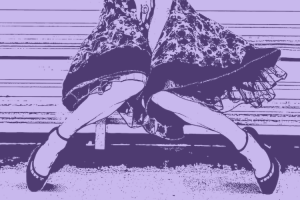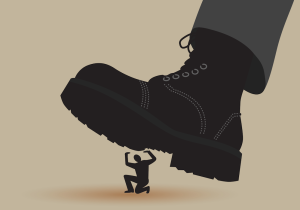Celia: In this video, I want to talk about sexism in higher education. I went straight to university after high school, took a year between undergrad and my masters, and another after that, and now I am doing my PhD.
I’ve been in and out of higher education for over seven years now. I feel more comfortable there than I do in the workforce, but there are still many issues with academia that make me uncomfortable. I have only just started working at my university as a TA, so I have only just begun to understand the gender bias that exists in the academic workforce, but I know I’m making my way into a field that is, as a whole, less than welcoming to gender minorities like women.
Before I continue, I want to note that the studies I’ll be citing are very much focused on women in comparison to men. This can have the effect of erasing non-binary folks in academia.
The reality is that non-binary academics exist, and there is an oppressive bias in the research that renders them invisible in discussions about systemic sexism in academia!
I only have the existing research to go on, but keep in mind that these issues are not only faced by cis women.
There are systemic issues. For instance:
- White women across all faculty ranks make about 78 cents for every dollar a man makes. Unsurprisingly, the pay gap is worse for women of color. Education improves earnings for women of all races and ethnicities, but earnings are affected by race and ethnicity as well as gender. White women are paid more than African American and Hispanic women at all education levels.
- Men make up a higher proportion of the highest paid ranks in higher education and are overrepresented at the higher-paying institutions like research universities.
- Women tend to drop out of the academic pipeline more often than men, for a variety of reasons like discriminatory workplaces or parenting choices. I remember going from having equal representation of men and women in my first few philosophy courses, to now having maybe three women in a class of 15 or so men.
- There’s even a citation gap – men get cited more than women, and a research article written by a woman and published in a top journal will still receive significantly fewer citations than if the same article was written by a man. Having fewer citations makes an academic less likely to be hired, or promoted.
- And a Yale study from 2012 found that a “feminine” name on a CV will be rated as less competent than a male name, and will be paid less. “Feminine” names are less likely to get the mentoring or job offers they need to even begin their career, let alone rise to the top.
There are also emotional and personal issues of sexism. For example:
- Women tend to be less confident in male-dominated workplaces. This is most apparent in workplaces that stem from academic areas which lack equal female representation – like science, math, economics, and my field- philosophy.
- A study from Berkeley that took place over more than a decade concluded that only women pay a “baby penalty” over the course of their careers in academia. It seems that family formation negatively affects women’s academic careers, while it positively affects men’s academic careers. There is a pervasive attitude of discouragement from university mentors when it comes to women having children. So it seems that women are being made to choose if they want to have a family or be in academia and rise in the ranks. Whereas men don’t have to make that choice, and in fact, starting a family can actually help their career.
- Sexual harassment is a huge issue in academia. My field, philosophy, has a serious sexual harassment problem. A disturbing number of male professors are sexually harassing and assaulting their students and colleagues. There is repeated failure to deal with these academic’s behavior by their institutions. Well-respected philosophers (many of whom specialize in ethics, ironically) are retaliating against those who speak up about their experiences. This is not unique to philosophy, but as an overwhelmingly male-dominated field, it isn’t surprising that these issues are so prominent.
And this is looking simply at gender bias! These studies do not even delve into the deeply ingrained racism of higher education – something I might explore in a future video.
For now, I’m only focusing on sexism, which as a white woman is easy enough to do – whereas for a woman of color in academia, it only accounts for one layer of marginalization faced. And this video also doesn’t address gender minorities who aren’t cis women.
This is because the stats simply don’t exist. And this is another example of gender oppression in academia.
Even in studies unpacking the problem, groups are being left out. Still, I think all gender minorities in higher education can in some way relate to these struggles, and it’s important to talk about the sexism (and other -isms) we encounter so that we can all work to make it a better, more inclusive space.
My experience with sexism in academia has been that I am more often questioned about my knowledge and ability by male peers and, now that I am TAing, by my male students too. My years in academia have refined my ability to articulate my thoughts, but I still struggle with getting the confidence to voice them in front of my peers.
I still feel silenced in a class of men. I feel like the boys I teach don’t take me as seriously as they would a male TA. While I also struggle with imposter syndrome, these feelings come from being in a setting that was not created for women to be included.
Academia is historically a boys’ club – a wealthy white boys’ club – so gender minorities like women, especially those who are multiply marginalized, are often left to find their own way.
As someone who has been in higher education for almost my entire adult life, I see and feel these struggles. I notice the disparity in my classes. I feel hopeless sometimes about my future in philosophy. And I have a great deal of privilege in these spaces.
However, as a woman, I also have a ways to go before I’m on equal footing with the white men I share these spaces with.
Talking about it is a good first step.
Let me know in the comments what your experience in university has been like as a woman!




















